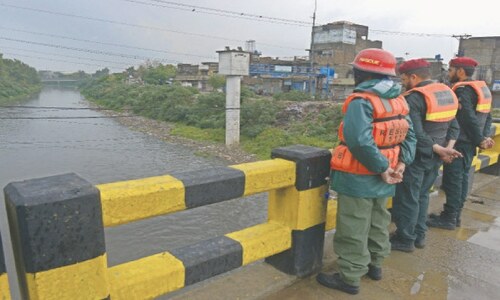THE right wing Jamaat-i-Islami is again in power in Khyber Pakhtunkhwa, making many uneasy and apprehensive.
The legacy of its last stint in power is far from being a source of pleasure for many. The future agenda, spelled out in its election manifesto, sends shivers down the spines of those who have read it.
THE LEGACY: After its over four-year stay in power as part of the Muttahida Majlis-i-Amal coalition government in Khyber Pakhtunkhwa, the province saw Maulana Fazalullah aka Mullah Radio led Taliban onslaught in Swat. The army was moved in to retrieve the area from Taliban, sending Fazalullah into hiding till date. The area continues to be at risk of Taliban’s re-emergence after army’s withdrawal, if implemented.
The Dir region of Khyber Pakhtunkhwa, the JI’s stronghold from where it won most of its seven provincial assembly seats in May 11 elections, has a strong presence of Taliban. The party, when it was in power last time, had a policy of appeasing pro-jihadi elements in Dir. It protected the illegally set up broadcast facilities at Dir mosques and religious seminaries from where orthodoxy was promoted.
Another thorny issue that defines the JI’s last stint in power happens to be the controversial Hasba bill 2005, envisaging the establishment of a network of mohtasibs (ombudsmen) from the tehsil to provincial level. Seen as an attempt to introduce the Mullah-led onslaught on modernism, the bill fell short of becoming a law only after the Supreme Court declared some portions of it as unconstitutional.
JI’S FUTURE AGENDA: The party has an unhidden pro-Jihadi narrative. On page 32 of its election manifesto, Jamaat-i-Islami promises to instill (if voted to power) a spirit of jihad in the armed forces and the nation as a whole. “Special arrangements would be made to impart compulsory military training to men and women of 18 to 35 years of age,” the party’s manifesto says.
The party does not shy away from making its Hasba-related intentions heard by all. As per its manifesto, it commits to introduce ‘Hasba Nizam’ (system) to ensure the provision of justice at one’s doorsteps. It has committed to introduce ‘amr bil Ma’roof (ordering for acknowledged Islamic virtues) and nahi anil munkir (forbidding from sin)’ to awaken society’s religious responsibilities and moral values.
On the economic front, it propagates to refuse payments of foreign loans taken during unelected eras by invoking relevant international laws and facilities available in this regard.
On the education front, it puts special emphasis on girls’ education, but its policy is of segregation of sexes. It promises to set up separate medical colleges and universities for female students. Similarly, taking the same concept to sport, it has committed, in its manifesto, to establish separate stadiums for female athletes.
The JI’s numerical strength in the new Khyber Pakhtunkhwa assembly is far less than its presence in the 2002 assembly when the party was the second largest parliamentary group in the six-party MMA coalition government.
Its numerical strength might be weaker this time, but its political significance has an extra value to the sitting coalition government’s leading party, Pakistan Tehreek-i-Insaf, a new entrant to the power politics in Khyber Pakhtunkhwa.
Despite dissimilarities in their elected members’ public appearance with the JI’s men wearing a conservative clergy look and PTI’s members of the assembly putting a comparatively modern face to the provincial coalition government, the two parties share common ground on many political issues.
Both PTI and JI are in support of striking down American UAVs to end drone attacks in the Federally Administered Tribal Areas. They have a shared position on resolving militancy in Khyber Pakhtunkhwa by means of negotiations with Taliban instead. Both ask for the withdrawal of army from Fata. Both propagate ‘an end to the begging bowl’ and ‘reliance on overseas Pakistanis’ to turn around economy, bringing foreign investment.
Beyond that, leaders of the two parties in Khyber Pakhtunkhwa avoid to describe ‘terrorists’ those who have been accepting responsibility for acts of terrorism.
Both, the PTI and JI are in support of holding local body elections, taking governance to the village level and diminishing members of the provincial assembly’s role in planning development activities.
With JI’s Sirajul Haq made responsible to head the provincial ministry of finance and Inayatullah Khan holding the portfolio of local government and rural development in the 14-member provincial cabinet, the party has a strong position to influence public policies, dictating the future politics in Khyber Pakhtunkhwa.
Overall, it has shown a lenient approach towards the problem of militancy in the province.














































